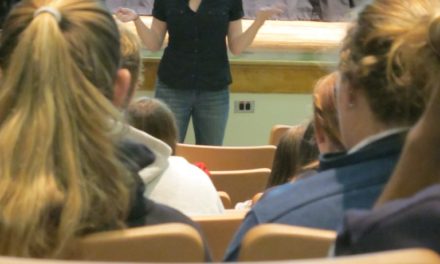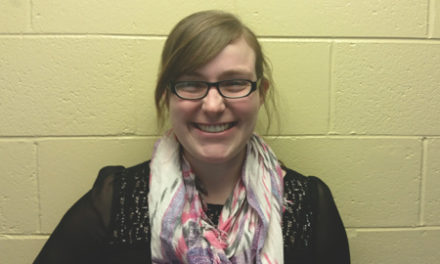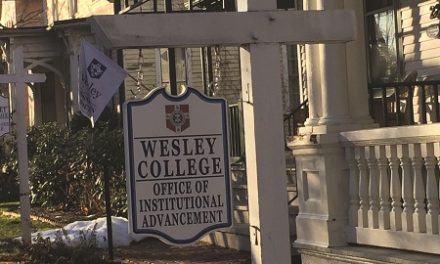By Khi’Asiah Holland; The WhetstoneÂ
Professor Paul Arendt experienced a spiritual crisis that changed his life.Â
“I became paralyzed in a garden, something that felt like a kind of death,†he said. “I was never a very religious person, and never all that inclined to consider spiritual matters.â€Â Â
Arendt took a train across the country and stayed in the mountains for months and wrote and thought about a lot then returned east. Â
“When I returned, I had another hallucination, or series of crippling visions for a few months,†he said. “I don’t know how to explain it without sounding like a mad man.â€
Arendt was born in Eaglewood, N.J., but was raised in Massapequa, New York.Â
“When I was 1 year old my family and I moved to New York and have been there for most of my life,†Arendt said. Â
Arendt had a great childhood growing up. Â
“I always used to play in the woods all day when I was younger,†he said. Â
Arendt was raised in a household with two parents involved in his life and his older sister, Stacy.  His mother inspired him to be great. His father worked as a banker for a company in New York for 30 years.Â
“She was deeply interested in other human beings, and kind to them. She was very well-read, funny and goodâ€, Arendt said. “She would take me to the bookstore every week as a kid and let me devour stories.Â
Arendt’s mother always managed to protect her children.Â
“I wasn’t allowed to play videos games, which seems to have protected me from wasting thousands of hours of my youth,†he said. “The older I becameÂ
the more I began to realize how blessed I was as a child because some children live tough lives.â€
“My mom was a teacher, and a compassionate person,†he said. “Everyone knew her name. She encouraged me to read, and seek, and if I am any good at all it’s because of her.â€Â
Arendt said he always had a passion for writing.

Arendt
“I always wanted to be a writer since I was 13 years old,†Arendt said.Â
Arendt later wrote a novel about his spiritual experiences, “Never an Orphan Soul.â€Â
“It helped me make sense of it all,†he said. “I published it myself, but I don’t imagine many people will read it.â€Â Â
Growing up his biggest heroes were Bill Hicks, George Carlin, Richard Pryor and Dave Chappelle, comedians, because they said things that other people were too scared to say. Â
“They each had a kind of danger in them, rough edges, and honesty, and insight,†he said. “My favorite comedic minds aren’t just funny; they are dangerous.â€
Arendt attended Seton Hall University, majoring in Communication and minoring in English. He attended graduate school for English in Villanova. Â
He moved to Delaware after facing many obstacles.Â
“I was homeless for about a year in a half, and decided to finish grad school,†he said. “Then, I moved in with my sister who lived in Delaware.â€Â
Arendt said he experienced an “inner crisis, and a spiritual crisis, I suppose,†he said. “My friend and his mother helped me through it, as did a shaman, and other friends.â€Â Â
Arendt slept on his friend’s hardwood floor for a year, then stayed with other another friend’s spare bedroom for about six months.Â
“My friends never asked me for rent money and they never asked me to leave,â€Â he said.Â
 He said he remained positive.Â
“I read a book a day, studied music, took long walks, meditated, and prayed,â€Â he said.Â
He became a professor eight years ago and works at three different schools as an adjunct.Â
Students said they admire his ability to care for others as well as his teaching skills. Â
“He genuinely cared about every single one of his students,†junior DeAndre Davis-Tolson said. “He was always willing to have open discussions about the harshest topics and still gave everyone a chance to share their own opinion.â€Â
Sophomore La’Nique Dukes said she thinks Arendt is a great teacher.
“He makes sure he takes his time with explaining and instructing his assignments,†she said. “He has no favorites and make sure everyone is treated fairly.â€Â
Sophomore Asia Lee said she likes how open his classes are.Â
“The thing I like the most about Professor Arendt is that he gets the class started by saying, ‘What is going on in the real world today? Is there anything new anyone wants to talk about,’†she said. Â
Arendt is not married. He said he recently met a woman on Facebook.Â
“We began talking during the pandemic about a year ago and have been bonding ever since then,â€Â he said.Â
He does not have any children, and is unsure if he wants them.Â
“I think I do want them, but it would take a lot to protect children from society today because things are different than they were back in the day,â€Â he said. “The internet, the screens, the cynicism. I’m the kind of person that would rather live in the woods and raise a family without all that noise.â€
Arendt is a part of a band named “Falsa.â€Â They play West African music.
They have not received a gig in a year because of COVID.
But he looks forward to playing again. It not only brought him joy to play, he said, but people hugged him after every show.Â





